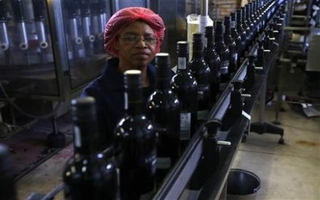 But if a trend toward bulk shipping continues, the music of the Rostberg bottling plant may be about to stop.
But if a trend toward bulk shipping continues, the music of the Rostberg bottling plant may be about to stop.Set in lush vineyards in Stellenbosch, one of South Africa's most famous wine communities, Rostberg has been operating below capacity for the past two years due to a shift to shipping wine in 24,000-litre polypropylene "flexitanks".
The trend has spread through other "New World" wine-producing countries like Chile, Argentina, Australia and New Zealand, which all have distant markets and, in the latter two cases at least, relatively strong currencies that are forcing them to cut costs to stay competitive.
Bottlers in South Africa are frantic about the likely loss of jobs. But another concern for some industry experts and government officials is the potential impact on South Africa's brand: when wine is bottled outside the country, winemakers lose control of a key part of the production process.
These are big concerns for South Africa, where the wine industry plays an outsized role in reshaping the country's image after years under apartheid, which ended in 1994.
"Wine has a tremendously important role to play in the development of Brand South Africa," said Anthony Budd, managing director of Cape Town-based wine exporter Diverse Flavours. "Wine is that much more romantic and seen as premium and coming from a beautiful location."
The number of people working directly or indirectly in South Africa's wine industry has risen to more than 275,000 people from just under 160,000 in 2000, and now represents 1.5 percent of the workforce in an economy dominated by natural resources.
The industry has made huge inroads as a producer of high-quality wines since overseas markets opened up after apartheid, said Michael Fridjhon, visiting professor of wine business at the University of Cape Town's business school.
"In 1994, we were the darling of the world," he said. "Everybody wanted to do something for the 'Rainbow Nation'... Since then, we've been on a steep learning curve."
Exports have soared more than 700 percent to a record 409 million liters in 2012. Now the country's biggest agricultural export earner, wine sets South Africa apart from other sub-Saharan African countries known for exporting predominantly raw materials.
Seventy percent of the 26 billion rand ($2.8 billion) it contributes to the national economy is focused on the Western Cape province, which boasts ideal conditions for wine-making with its Mediterranean climate, mountain slopes and valleys, and sea breezes from the Atlantic and Indian Oceans. The Western Cape is also where the majority of bottlers are located.
JOBS
Nearly half of all wine from South Africa, Australia, New Zealand, Chile and Argentina is shipped in bulk, up from around a fifth a decade before, according to a report published last year by Dutch bank Rabobank entitled 'The Incredible Bulk. The Rise in the Global Bulk Wine Trade'.
As recently as 2009, just over 61 percent of South African wine exports were bottled domestically but that share dropped to 40 percent last year, according to industry export and promotion group Wines of South Africa (WOSA).
Bulk exports overtook bottled shipments in Australia for the first time in January 2011, industry group Wine Australia said. Major Australian producers like Jacob's Creek are now bottling in Britain, the world's largest wine import market.
Bevan Newton Johnson, managing director at First Cape, the largest South African wine brand in Britain, said the company mothballed its own bottling facility nearly two years ago, laying off around 40 people.
"Our products were not profitable in the overseas markets," he said.
The South African government is concerned about the effect on employment. Close to 1,000 jobs were lost due to the shift to bulk as of the end of 2011, according to the Department of Trade and Industry, and industry representatives said the trend suggests that more cuts are coming.
In South Africa, where the unemployment rate has remained at 25 percent for years, that has a multiplier effect - the country has one of the highest "dependency ratios" in the world at an average of three non-working people supported by every worker, according to a January 2013 report by the South African Institute of Race Relations.





